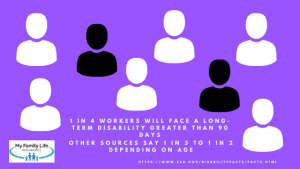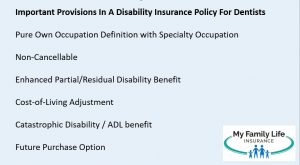What Dentists Need To Know About The Right Disability Insurance [Protect Your Loved Ones And What You Worked So Hard For]
Updated: April 12, 2024 at 9:39 am
 I think you’ll agree, if you are a dentist or dental surgeon, you need your income. What happens if you can no longer work due to an illness or injury? How will you take care of your practice and your family? That’s where disability insurance helps dentists.
I think you’ll agree, if you are a dentist or dental surgeon, you need your income. What happens if you can no longer work due to an illness or injury? How will you take care of your practice and your family? That’s where disability insurance helps dentists.
Your disability could affect the lifestyle you worked so hard for and your future plans. A disability, where you can’t go to work and earn an income, happens way more often than you think. In this article, we discuss what dentists need to know about selecting the right disability insurance.
Here’s what we will discuss. This is a comprehensive article, so feel free to jump around as needed:
- Who is more important in your life? Why you need disability insurance
- Disability insurance underwriting for dentists and dental surgeons
- What does the right disability insurance mean to you?
- The components of a strong disability insurance policy for dentists and dental surgeons
- Probable disability insurance costs for dentists
- Now you know the importance and selecting the right disability insurance for dentists and dental surgeons
Let’s start with understanding the need for disability insurance. It’s great to put that into perspective.
More Important People Rely On You
I usually cut to the heart when it comes to disability insurance. I know your patients certainly are very important. However, there is also a group of people who are more important. Who can be more important than my patients, you think. They pay the bills.
True. They do, but they don’t love you as your family loves you. That is the truth.
We work so hard day in and day out, sometimes we forget the ones who truly  matter in our life. I get it! Like you, sometimes that happens to me and my wife.
matter in our life. I get it! Like you, sometimes that happens to me and my wife.
By far, if you have a family, your spouse and children rely on you more than you think. They love you more than anything.
What if you could no longer work as a dentist or a dental surgeon? What if you get in an accident or you receive a cancer diagnosis?
Hey, a disability happens. More often than you think. (I’ll get into this more.)
Do You Want To Make Hard Decisions About Your Future?
If you are disabled, without disability insurance, get ready to make some really, really, hard decisions about yourself, family, and future. There are tough questions that need answering. Would you and your family be able to continue your standard of living without your income? If not, what changes would need to be made? Would your spouse have to work or work more? Would you need to sell your home to make ends meet? (Hey. That happens!) Who could be flexible with the children? Would you have the money to hire someone to take care of the kids? The tough questions can go on and on.
Disability is known as the destroyer of dreams. Your future and family dreams could be destroyed. They don’t have to, though. With disability insurance, you have peace of mind knowing that you have a plan – and income – in place should the unexpected happen.
Yes, But A Disability Won’t Happen To Me
We think we are invincible, right? A disability happens to the “other person”. Not me!
I am healthy, you say!
Everyone says that!
 Did you know the probability of having a long-term disability is anywhere between 1 in 3 and 1 in 4 workers? Even the healthiest of people are disabled every day.
Did you know the probability of having a long-term disability is anywhere between 1 in 3 and 1 in 4 workers? Even the healthiest of people are disabled every day.
Contrast this statistic to an unexpected death, say from a motor vehicle accident, which is 1 in 114. Even dying from cancer has better odds: 1 in 7.
But, John, I’m not going to get hurt or be in a wheelchair, you say. Wow! I respond. If you know that, then you should not be a dentist or dental surgeon. You need to get a job telling the future!
I’m joking. In all seriousness, when we think of disability, we think of someone bound in a wheelchair, right? Not true and far from it. According to the Council For Disability Awareness, 90% of disabilities are from illnesses (like cancer) than from accidents. That means an illness or condition, such as cancer or a heart condition, has a higher probability of disabling you than a skiing accident.
Ok, John, but I have workers compensation. I don’t need to worry about money. That’s great, I say. Did you know that 5% of disabling conditions are work-related, leaving the other 95% not covered by workers compensation? That makes sense, since 90% of disabilities are from illnesses.
Again, what is your income plan if you can’t work?
Disability Insurance Underwriting For Dentists And Dental Surgeons
Hopefully, we have made a great case of why dentists and dental surgeons need disability insurance. You have a lot at stake. Not only is your career and livelihood at stake, but also your family.
When you submit your disability insurance application, the application goes right to the underwriting department.
What is underwriting, you ask? We discuss this next.
Disability Insurance Underwriting For Dentists
Underwriting is the process of analyzing your application for coverage. Insurance carriers look at 4 aspects in the disability insurance underwriting process for dentists:
- age
- income
- health conditions
- occupation
Your age and income are straightforward. The older you are upon application, the higher the premium. The more money you make, the higher your premium. Don’t worry about premiums. We’ll get to that later. Premiums matter, but they should not be the driving decision factor.
It’s important to note what “income” means with disability insurance. It can mean several things as we explain.
If you work for another dentist and considered an employee, your income is your W-2 gross salary. This amount is located in box 1.
If you are a partner, or part owner, generally speaking, your income is on the K-1 statement (if a partner). If you are a sole-proprietor, 1099 contractor, LLC, or S-corp, then your income is your net income and any salary you pay yourself. We are often asked why net income? The reason is that this net income is the money you use to pay your mortgage, your groceries, every day expenses, etc.
If you have business expenses, these expenses are insurable with a different type of policy. We discuss this further in the article.
Why Health Conditions Matter In Underwriting
Health conditions play a significant part in underwriting. Usually, carriers exclude pre-existing health conditions from coverage. For example, if you broke your right wrist 5 years ago, your policy excludes coverage on that right wrist. If you had complications of pregnancy, then the carrier excludes any complications of future pregnancies. That’s just how disability insurance works. Remember, the carrier is underwriting your potential disability. So, it will (generally) exclude any health complications or injuries you’ve had in the past.
If you have more serious health conditions, the carrier could place a rating on your policy. A rating is an extra premium the carrier charges for an increased disability risk. Moreover, the carrier may limit options such as limited waiting periods or reduced benefit periods.
I am surprised at the number of people who balk when I tell them about the exclusion on their pre-existing condition. That is how disability insurance works. It is not governed by the pre-existing mandate of the ACA. If you were a disability insurance carrier, would you cover pre-existing conditions? No, you would not.
Having an exclusion or a rating is not a reason to ignore a disability insurance policy. There are nearly endless ways for a disability to occur. If you have a health condition, understand that likely it will be excluded. Is that the end of the world? No. Remember what is at stake here. If you do want some coverage for a pre-existing health condition, some hospital indemnity plans cover pre-existing conditions after a waiting period. Contact us to learn more.
 Your Occupation Matters, Too!
Your Occupation Matters, Too!
So, all the disability insurance carriers classify occupations. In general, the carriers classify from 1 or A to a 5 or 6. An occupation with a class 6 has the lowest disability risk due to occupation and class 1 has the highest. All things being equal, you’ll pay a higher premium if you are a class 1.
Disability insurance carriers usually classify dentists and dental surgeons between a class 3 and 5 or 6. The range is due to your type of dentistry. If you are a general dentist practitioner, your class is a 3 or 4 depending on the carrier. Conversely, dental surgeons typically have a class 5 or 6.
So, what does this have to do with dentists?
Well, it just means the potential for a higher on-the-job disability. Carriers underwrite this by assigning your occupation a classification number.
While there is general alignment among the disability insurance carriers, some carriers elevate your classification higher. All things being equal, carriers with a higher occupation classification save you money with lower monthly premiums.
What Is The “Right” Disability Insurance For Dentists
So, here’s an insider tip.
There is no “right” disability insurance for dentists.
What, you say!
Let me explain.
There are certainly ones that would not be the right fit. These plans may include, for instance, the wrong definition of disability for dentists. Additionally, they may have income limits.
Moreover, there are ones that start out with a really low premium in order to get dentists covered. But…(there’s a catch) the premiums increase every year thereafter. If your intention is to hold your policy for the rest of your working life, and likely so, this is a very bad deal.
I am a CFP® professional, and I know if you can’t find the ways to pay for a level premium plan, then it’s not that important to you. Sorry.
The “right” one is really the one that meets your needs and has the required foundational components we describe below. This is extremely important for dentists.
We did, however, list the disability insurance plans we feel are the best for dentists and dental surgeons. Feel free to check that out. There are a handful of carriers we like for dentists.
The Components Of A Strong Disability Insurance Plan For Dentists And Dental Surgeons
Our goal when designing disability insurance plans for dentists and dental surgeons is the right combination of value and premium. As we stated before, however, in a dentist’s case, more weight should be applied to value and plan structure. With considerable investment and likely a business ownership, dentists have a lot at stake.
 Premiums, while important and considered, should not be the main decision factor. If it is, then you are misaligning disability insurance and its importance.
Premiums, while important and considered, should not be the main decision factor. If it is, then you are misaligning disability insurance and its importance.
Having said that, do we ignore the cost? No! It’s just that we put more weight on plan structure and coverage rather than premiums.
Let’s get into the components that make up a strong disability insurance plan for dentists.
True Own-Occupation Definition (Specialty Definition)
The definition of disability matters for dentists. It really does. You want the “pure” or “true” own occupation coverage with a specialty. The plans we work with for dentists and dental surgeons contain this favorable definition. The pure own occupation means you can work in another job if you are receiving disability income payments.
The specialty definition comes into play if you specialize within your dentistry industry. For example, if you are a prosthodontist, that is your occupation.
The “true” definition displays its importance upon a disability. Let’s say an injury prevents you from doing your job as a prosthodontist or an endodontist, but you can assist a general dentist in your area or teach basic dentistry at a local community college. The “true” definition allows you to receive disability benefits as your specialty and receive an income in your other job.
Note the other definitions of disability available including variants of the own-occupation definition. Be aware when reviewing illustrations from carriers.
Benefit Period To Age 67
The benefit period is the timeframe you receive disability benefits for one claim. A common benefit period is a 5 year benefit period. For example, if you severely hurt your back and can’t work, you could receive benefits up to 5 years for that injured back.
After that, if you are still disabled, you’d have to find a new job/work (if you can) or rely on social security disability benefits.
If you know anything about social security disability…well, it’s a long application process, and you don’t receive much.
You can see, as a dentist, having a benefit period of 5 years (in this example) is a bit risky. While most disabilities are 15 months to 24 months, the chance of a very long-term, catastrophic disability exists.
Here’s a quick example. Let’s say you make $300,000 with a 5 year benefit period. Tragically, you are injured in a car accident. You receive your disability benefit as well as a catastrophic benefit. You receive $25,000 each month in total. Five years goes by pretty fast and in year 6, benefits stop.
What do you do next?
I know…it seems very scary.
As someone with a high income (or high future earnings potential) and business ownership possibly at stake, do you want to take that chance?
No!
That’s why we recommend the “to age 67” benefit period for dentists. While a 5 year, and even a 2 year, benefit period is probably adequate for a majority of occupations, it is not for the dentistry occupation.
Residual / Enhanced Partial Disability Benefit
When they hear the word “disability”, many people think of someone in a wheelchair or someone who is completely and totally disabled.
This happens, but not all disabilities start or end up this way.
Many disabilities start as a partial disability. That is, you are disabled, just not totally. In other words, you can still work, but not full time.
How will you get through this loss of income?
This is where a partial / residual disability benefit comes into play. This is extremely important coverage. You’ll want to make sure your carrier includes this.
Why?
Because many carriers don’t! At least, not well enough!
Usually, you need to lose a minimum amount of income, say 20%, to qualify. Other carriers say it is a loss of substantial duties OR time.
Here’s how it works (generally speaking, of course). Shirley makes $50,000 and is injured. She returns to work part-time (i.e. this is known as a “residual” disability) and makes $25,000. This is a 50% loss, so Shirley receives 50% of her total monthly benefit.
Here is an important feature you’ll want to make sure your policy has:
You’ll want to make sure your partial/residual disability benefits are paid without a totally disability requirement.
Why is this important? Let’s say your policy – and some do – only pays a residual/partial disability benefit after you’ve been totally disabled. You receive word from your neurologist that you have Multiple Sclerosis. This condition, usually, starts out as a partial and transitions to a total disability.
If you have a policy that only pays a partial benefit after a total disability, you are out of luck. Stay away from policies that require total disability before the carrier pays any partial/residual benefits! It’ll read something like this:
Future Purchase Option
Another important component of a disability insurance policy for dentists is the future purchase option. Carriers have different names for this, but it all means the same thing. This option allows you to purchase more disability insurance without (yes, without) any underwriting.
This is a hugely important option, as purchasing more coverage is the best way to keep up with your lifestyle and needs.
Did you catch an important feature of this option?
That’s right…no underwriting is required to purchase more disability insurance!
This is incredibly important. Here’s why. Let’s say 3 years ago you were diagnosed with type 2 diabetes. You’ve managed it well. However, disability insurance carriers don’t see it this way. Carriers limit coverage on people with type 2 diabetes.
Three years ago, your income increased by $100,000! Your agent tells you to protect that increase. Here’s how this situation plays out:
- without a future purchase option: you would have to completely go through underwriting on a NEW policy. Because of your type 2, carriers limit your coverage one way or another
- with a future purchase option: you can increase your coverage NO PROBLEM!
All you need to do is show that your income increased. Carriers will simply require a copy of your filed tax forms to do this.
Cost-Of-Living Adjustment
I usually don’t recommend this option for most people. (I’ll explain why in a second.) However, this is an important component of a strong disability insurance policy for dentists.
Many agents (and insureds) get this option wrong. They think this adjustment gets added to your monthly benefit every year automatically. No. (That is called an Automatic Benefit or Future Benefit Increase.)
The cost-of-living adjustment increases your monthly benefit by a contracted percentage after being on TOTAL disability for more than 1 year.
In other words, once you’ve been totally disabled for 12 months, your cost-of-living adjustment applies to month 13 of total disability and on.
Remember I said that most disabilities last anywhere from 15 months to 24 months? That applies to everyone. A cost-of-living adjustment becomes important on really, really long-term disabilities, such as catastrophic disabilities. Most disability payments won’t even receive the cost-of-living adjustment.
This option can be expensive for the average person. A catastrophic disability is uncommon. Moreover, the average long-term disability lasts up to 24 months or so. Knowing this, the average person could ignore this option. Everyone is better off purchasing more disability insurance through future purchase options and taking advantage of automatic benefit increases.
However, that is not the case for dentists. Again, the reason is you have a lot at stake. What if you are catastrophically disabled or have a long-term disability lasting more than a year? This option adjusts your monthly benefit on top of the other benefits you receive.
Catastrophic Disability Benefit
A good segue. A catastrophic disability benefit is an extra benefit paid to you if you (typically):
- can’t meet 2 out of 6 activities of daily living, or
- irrevocably cognitively impaired
Think of a severe injury or early-onset Alzheimer’s.
This benefit is paid in addition to the base monthly benefit.
The purpose of the catastrophic benefit is to offer additional financial protection for these severe disabilities.
A catastrophic disability benefit usually does not cost much. The reason why is that these types of disabilities, while they do happen, don’t happen often.
However, as we said before, we can’t stress enough the need for dentists and dental surgeons to protect themselves and their families. Do not overlook this rider option.
Non-Cancellable Option
Most disability insurance policies are guaranteed renewable at a minimum. This means the carrier can’t increase the premiums or change the provisions unless the state insurance commission approves the change. Moreover, the carrier must do so for an entire class of people, not just one individual.
Most people should be OK with a guaranteed renewable policy. However, dentists and dental surgeons should consider a non-cancellable provision. Non-cancellable means the carrier can’t change anything about your policy. Once it is locked in, it is locked in for life. That means premiums and policy structure remain the same, and can’t change, provided you pay the premiums.
Other Important Disability Insurance Considerations For Dentists
Here are other provisions dentists should consider with their disability insurance policies. These are not available with all carriers.
Return of Premium Rider: The carrier pays you back the premiums you paid if you never file a claim. Additionally, they pay back the net premiums if you do end up making a claim, but the disability benefits are less than the premiums you paid. In other words, premiums paid – disability benefits paid to you = net premiums.
Rehabilitative Benefit: Carriers pay this extra benefit so you can get back to your work quicker.
Critical Illness Benefit: Some carriers offer a critical illness benefit as part of their plan. Others offer it as a rider.
Student Loan Provisions: A few carriers offer an extra benefit to pay for student loans.
Family Care Benefit: One carrier we like offers a Family Care Benefit. If you have to step away from your practice to care for your loved one, including elderly parents, the carrier pays you a percentage of your monthly benefit. The purpose is to help you during that difficult time.
If you’d like to learn more, we discussed this carrier in our best disability insurance policies for dentists.
As you can see, there are many benefits available to fortify a disability insurance plan for dentists.
How Much Does A Disability Insurance Policy Costs For Dentists?
We all want to pay the best price for something and not overpay.
Purchasing disability insurance is no different.
However, it’s important to not be skimpy on this important insurance.
Generally speaking, most people spend 2 to 3 cents on every dollar of benefit.
Think about that. Two to three cents!
However, for dentists, expect to pay a little bit more. The reason is that you are purchasing much more coverage.
Dentists can expect to pay 5 cents to 10 cents for a dollar of benefit, depending on the underwriting factors we discussed earlier.
Is that still affordable? Yes! Remember, we suggest dentists have more coverage because you have a lot at stake.
Here’s an example of a female doctor we helped. A 28 year old with all benefits we described, a $6,100 monthly benefit (with catastrophic which adds another $4,000 per month) cost about $400 per month. While that may seem like a lot, that is $400 per month for the rest of her life. If she elected to do so, she can then purchase additional insurance as her income increases.
Now You Know How Dentists Select The Right Disability Insurance
We hope now you have a great idea on how dentists select the right disability insurance. This is extremely important coverage. We went through the components that make up a strong disability insurance plan for dentists.
Confused? Don’t feel that way. We’re here to help educate you and protect your income and future. Don’t know where to start? Use this disability insurance needs analysis worksheet. Follow the instructions; it is rather easy to fill out (we at My Family Life Insurance try to make understanding insurance easy). Next, feel free to reach out to us for our assistance or a quote. Alternatively, you can fill out the form below, and we will be in touch soon.
We only work for you, your family, and your best interests only. We have helped many dentists and dental surgeons secure the right disability insurance for their specific situation, giving them and their families peace of mind.
Learn More
Are you interested in learning more about the information in this article? Please fill out the form below, and we will email you additional information or give you a call. We always work in your best interest. By entering your information, you are providing your express consent that My Family Life Insurance may contact you via e-mails, SMS, phone calls, or prerecorded messages at any phone number(s) that you provide, even if the number is a wireless number or on any federal or state do-not-call list. Additionally, you understand that calls may be placed using automated technology, and that consent is not a requirement for purchase. Your information will NOT be sold and will remain private. However, you may opt out at any time. We respect your privacy first and foremost. By contacting us, you agree to receive text messages from our number (800) 645-9841. If you no longer wish to receive text messages, you may opt out at any time by replying "STOP".
